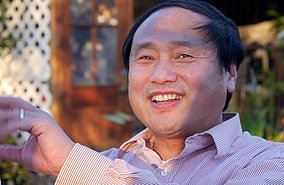Wang Juntao
... was born in 1958 in Beijing. In 1978 he was admitted to study at the Technical Physics Department of Peking University, later he obtained a master's degree in public administration from Harvard University, and a PhD in comparative politics from Columbia University in New York.
Back in China, Wang was imprisoned a first time when he was a 17 years old pupil at the Beijing Middle School No. 1, because he had organized class-mates to participate in protest activities at Tiananmen Square during the mourning of Zhou Enlai. Because of four critical poems that Wang had posted at the square, he was named an "behind-the-scene organizer and orchestrator of the counter-revolutionary incident" and author of "reactionary lyrics". Wang Xizhe was held until November in the police arrest ward of Haidian District.
With the new reformist policies under Deng Xiaoping, the evaluation of the Tiananmen events of 1976 also became more positive. Wang Juntao was now considered a "hero", and in late 1978 he was made an alternate member of the Central Committee of the Communist Youth League. Sympathizing with the Democracy Wall Movement, Wang became an editor of the independent journal "Beijing Spring" in 1979, and in 1980 he participated in the electoral campaign at Peking University. He finished second in the official ballot, but because he had received slightly unter 50 percent of the vote, was not considered an elected deputee.
In 1989 Wang participated in the Tiananmen Students' Movement, and was later accused of "counter-revolutionary agitation" and "incitement". In 1990 he was arrested again and in February 1991 sentenced to 13 years imprisonment, but allowed to travel abroad on medical parole in 1994, when he was directly delivered from prison to an aircraft that brought him to the US. In 2010 Wang became chairman of the National Council of the Chinese Democratic Party (one of several exile factions). He now lives in New Jersey.
Interview with Wang Juntao (on May 30, 2014 at the Asiatic Hotel in Flushing, New York)
Here you find the Chinese text of the interview. Some excerpts in English:
Wang Juntao on his meetings with Communist Party leaders:
I have talked once with Hu Qiaomu, he was a rather disgusting person. When I talked to him in his apartment and said, one had to do away with corruption, he just answered: "Corruption has existed through all the dynasties, one cannot just do away with it, and this is not necessary." ...
I liked and esteemed Hu Yaobang a lot. By Chinese standards he was not very mature yet, therefore it was easy for his political adversaries to attack him. I believe that Deng Xiaoping wanted to sponsor and support him, but I noticed that he was a person difficult to control because of his frankness. ... We talked for several hours. At first, our conversation should have lasted 15 to 30 minutes, but then he was so much into our talk that it continued for several hours. He told me that he had stayed at home that day because of a painful tooth, but I think that he took the day off because he actually wanted to talk with us. Before it began, I met his secretary. Introducing myself, I had told him I was the deputy editor-in-chief of the journal "Spring of Peking", but the secretary suggested "Maybe this is not so appropriate, let's call it a conversation between the elder and the younger generation." That's how I went in. We talked on a variety of subjects, in short I said that I hoped for reforms in China, that there were no political persecutions any more, that China would never return to the time of the Cultural Revolution. ...
I clearly told him, that I opposed the detention of Wei Jingsheng. Hu Yaobang did not give an answer to this. He just pulled out a report by the Guizhou Provincial Party Committee and said: "Look, the Guizhou Provincial Committee had ordered the arrest of Huang Xiang from the "Enlightenment Society" and later released him again because of humanitarian considerations. I agree that this should be our way to solve problems. He were against political persecution. I then said: "You have to enact political reforms." He answered: "I do want reforms to the point that even my tooth hurts and that I find no sleep because I am always pondering how China should be reformed. But reforms are not that simple as young people like you might think. ...
Later he added: "Young people like you have three advantages: First, you have ideals; secondly, you are well educated; and thirdly, you have the zeal and energy to realize your aspirations. But you also have two disadvantages, you are not realistic, you never start from the facts when you consider what has to be done, you only believe it must be done like this or like that; and secondly you are impatient and always worried." Much is not done well because of too much worries. The conversation with Hu Yaobang left a strong impression on me. And one reason why I did not oppose the Communist Party for such a long time, was that the were reformers like Hu Yaobang within the Party. ...







